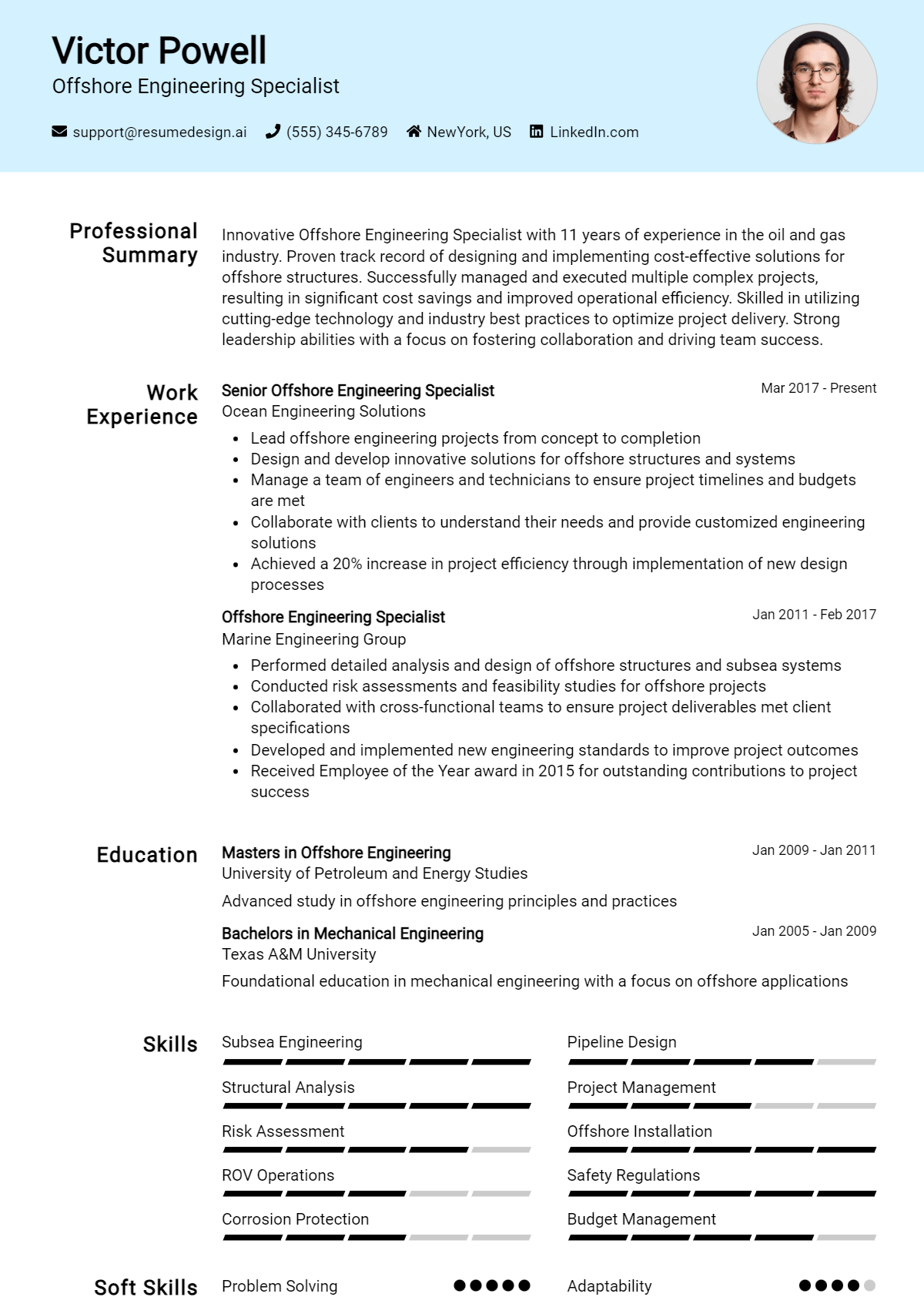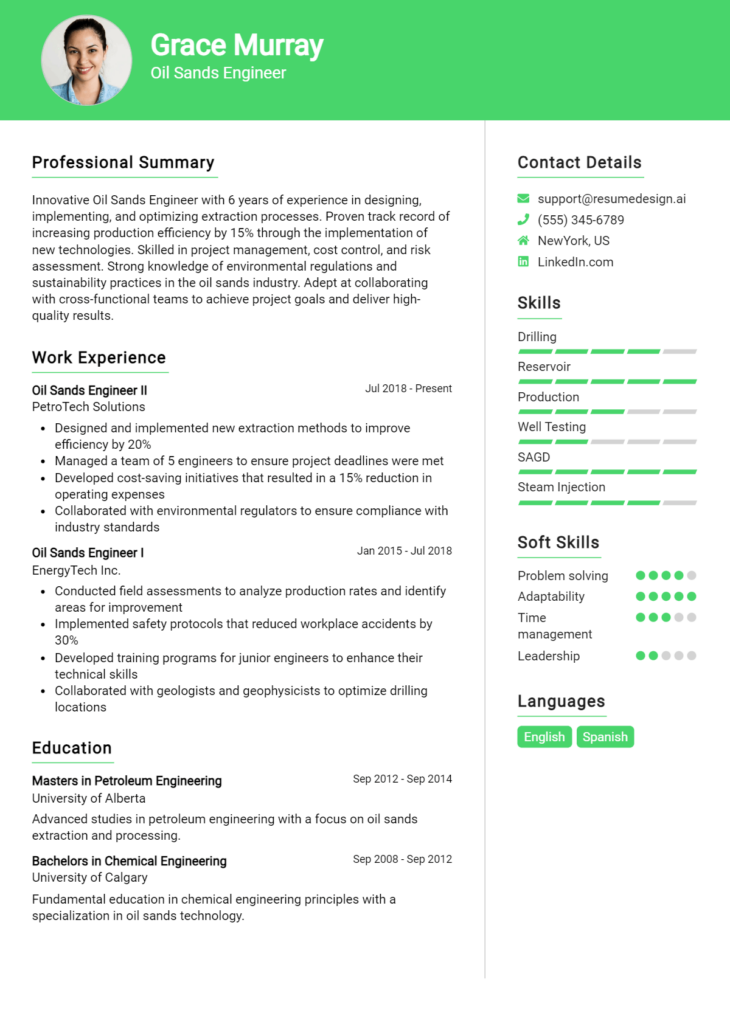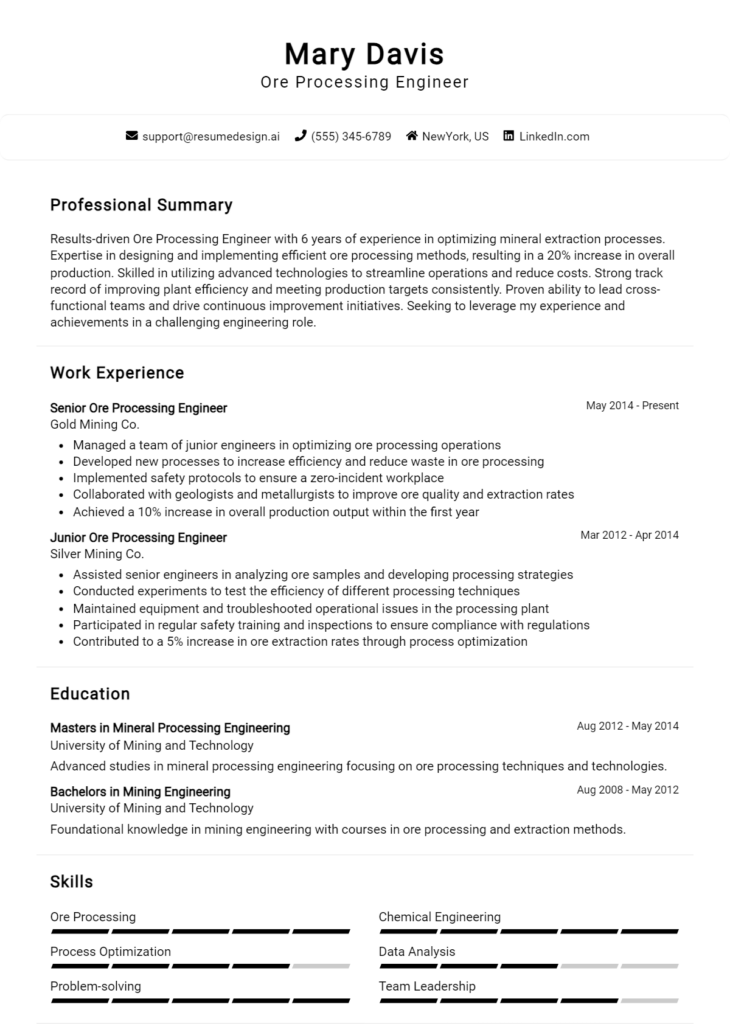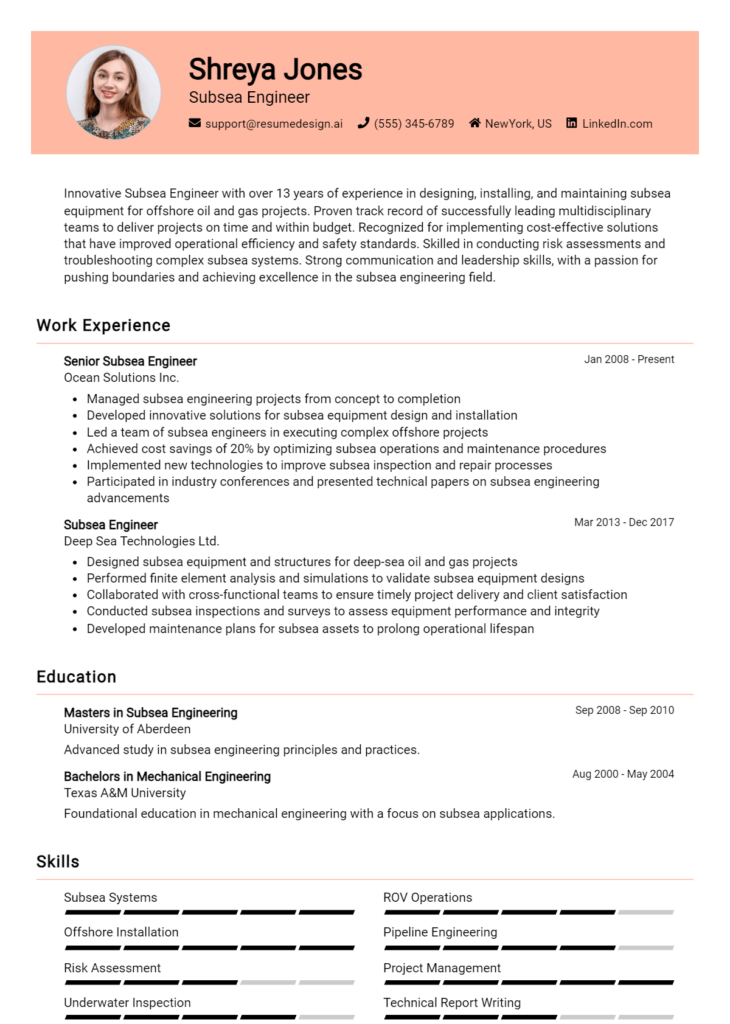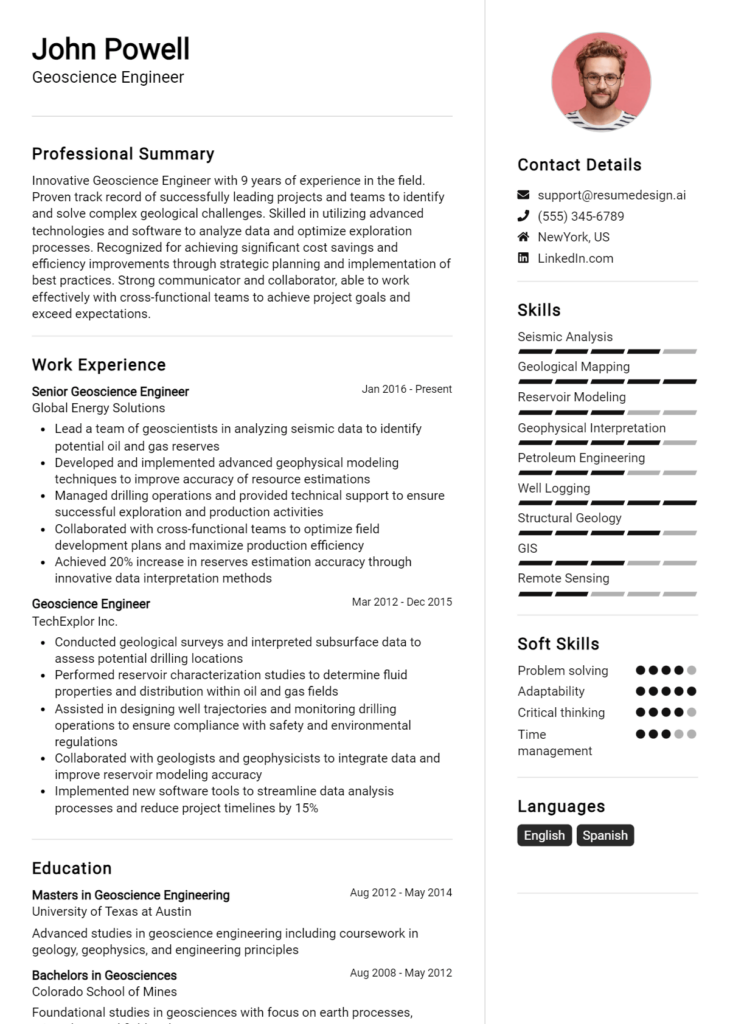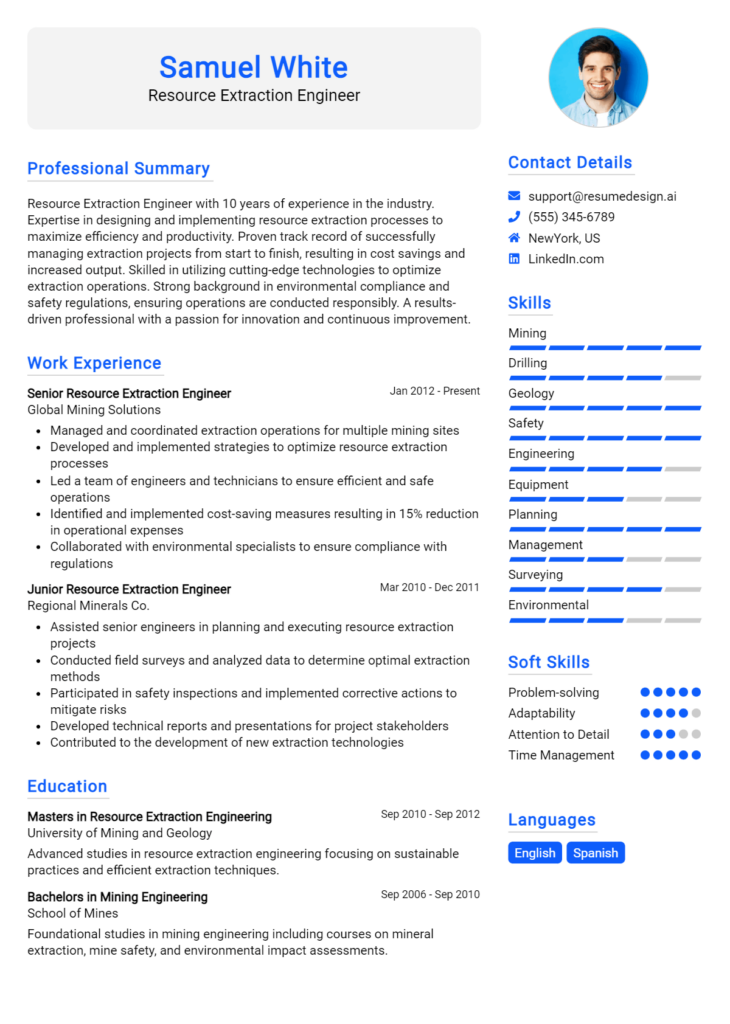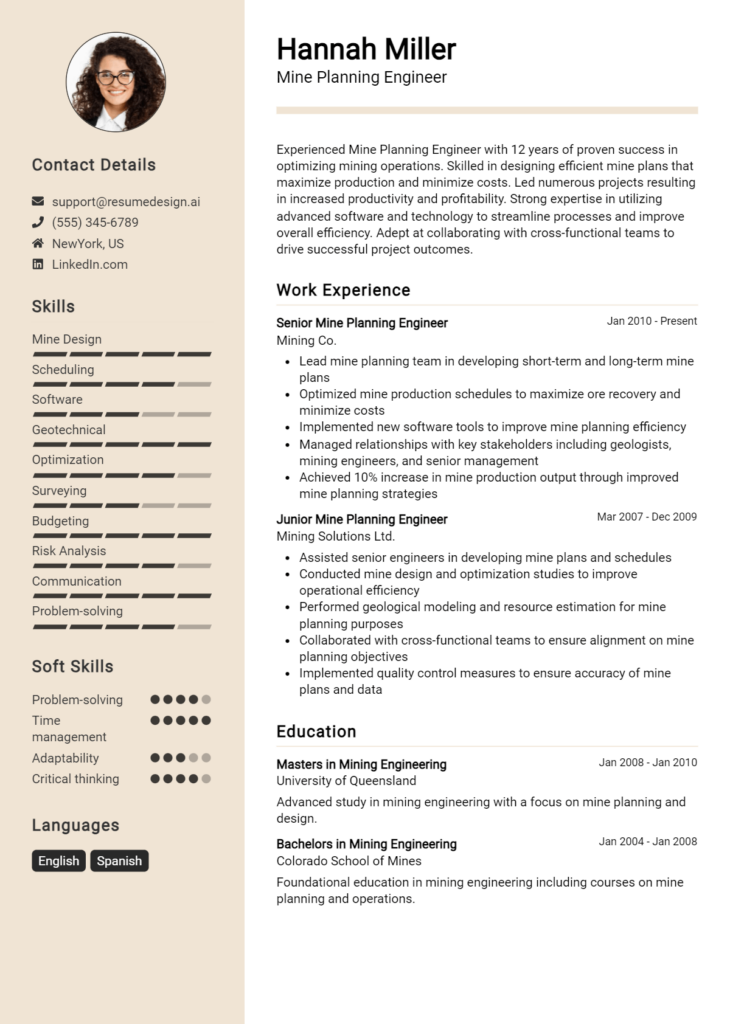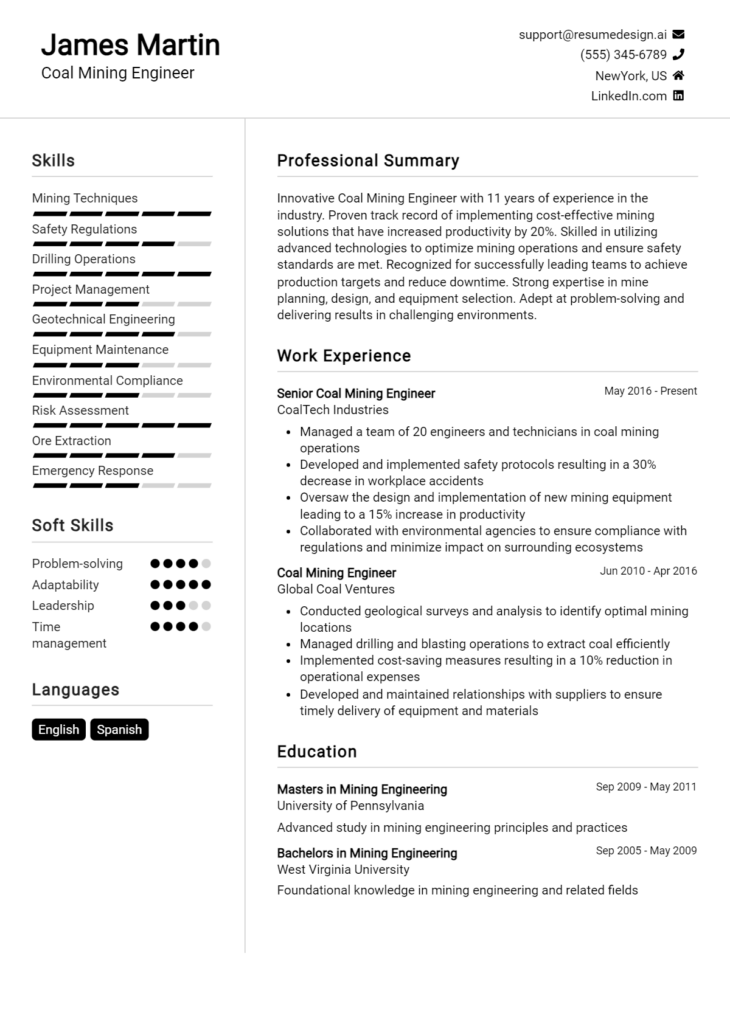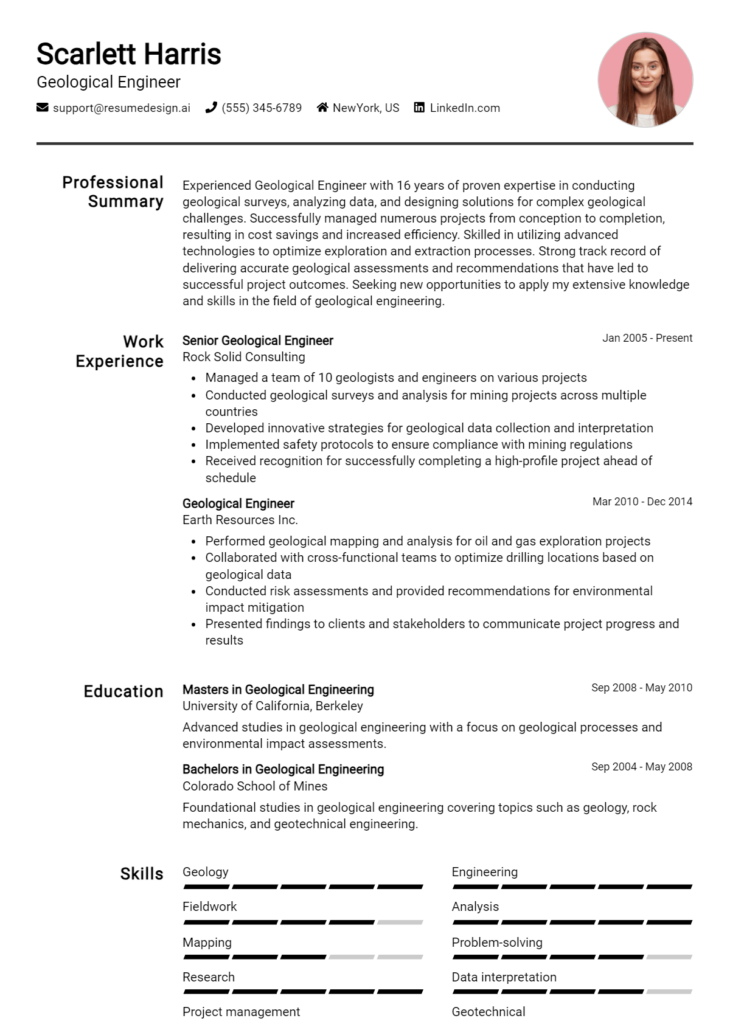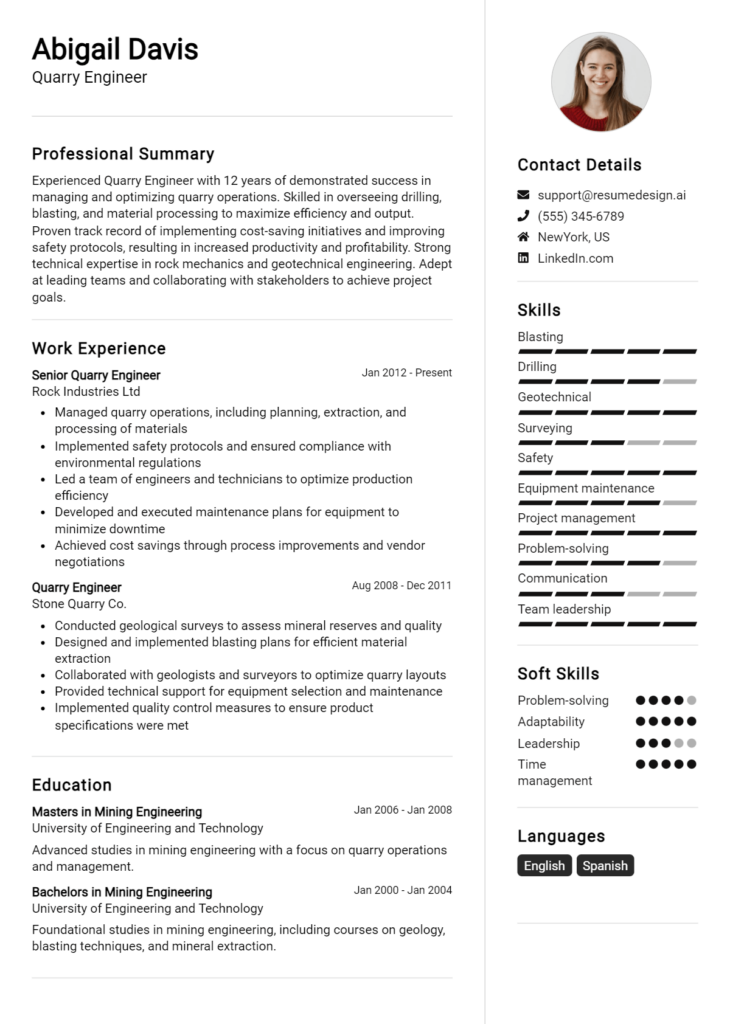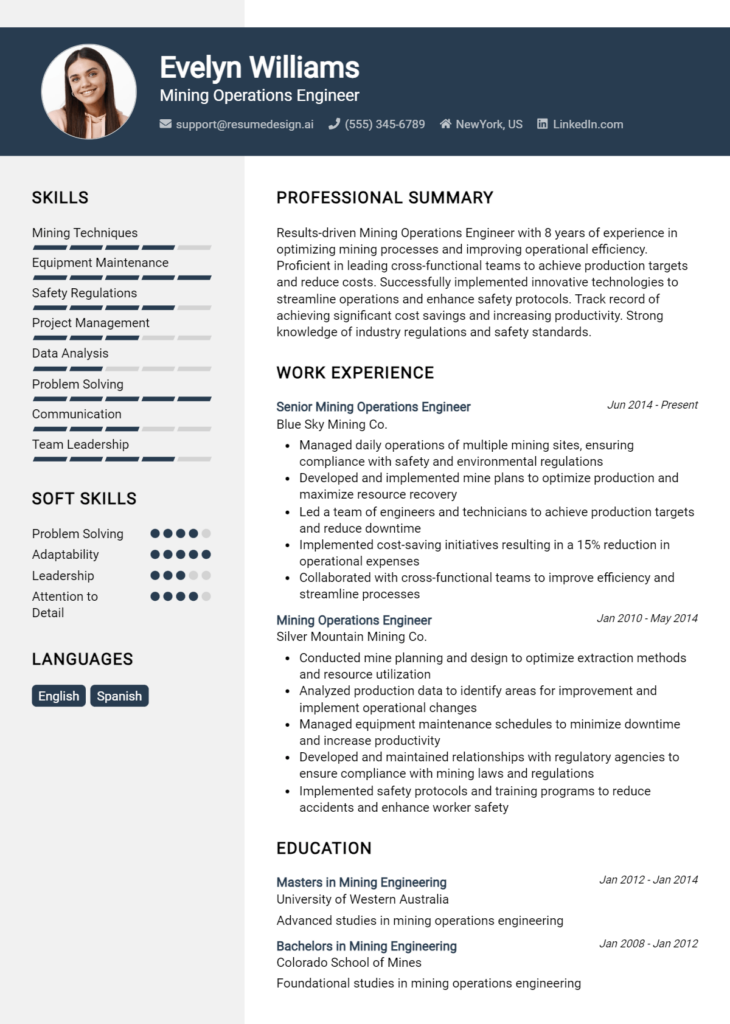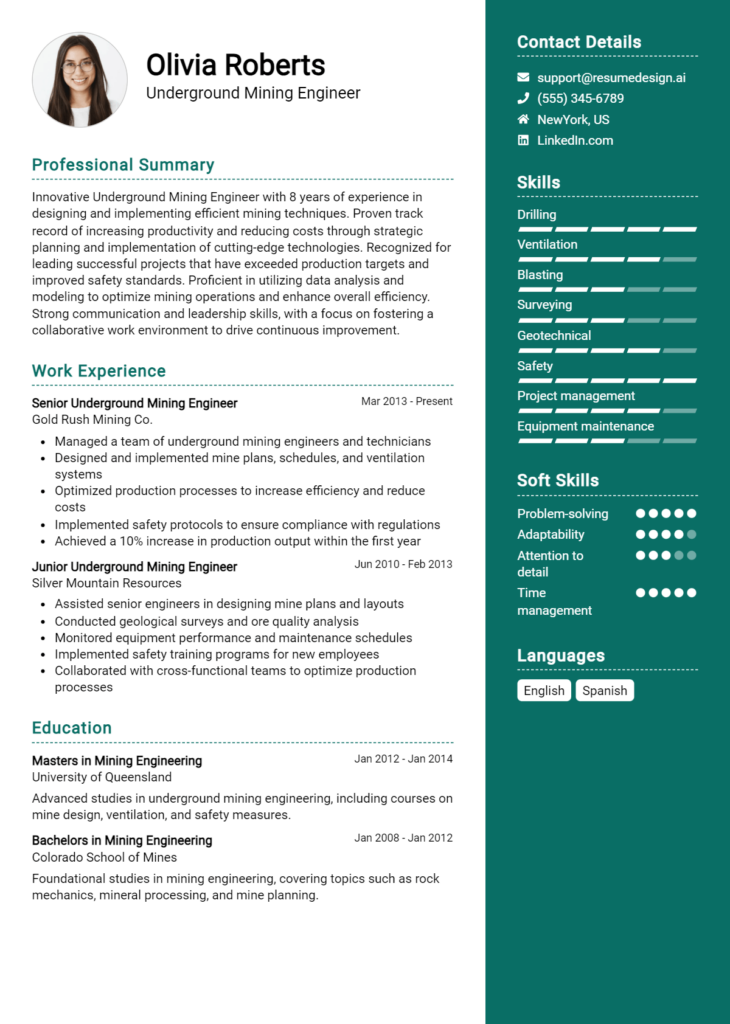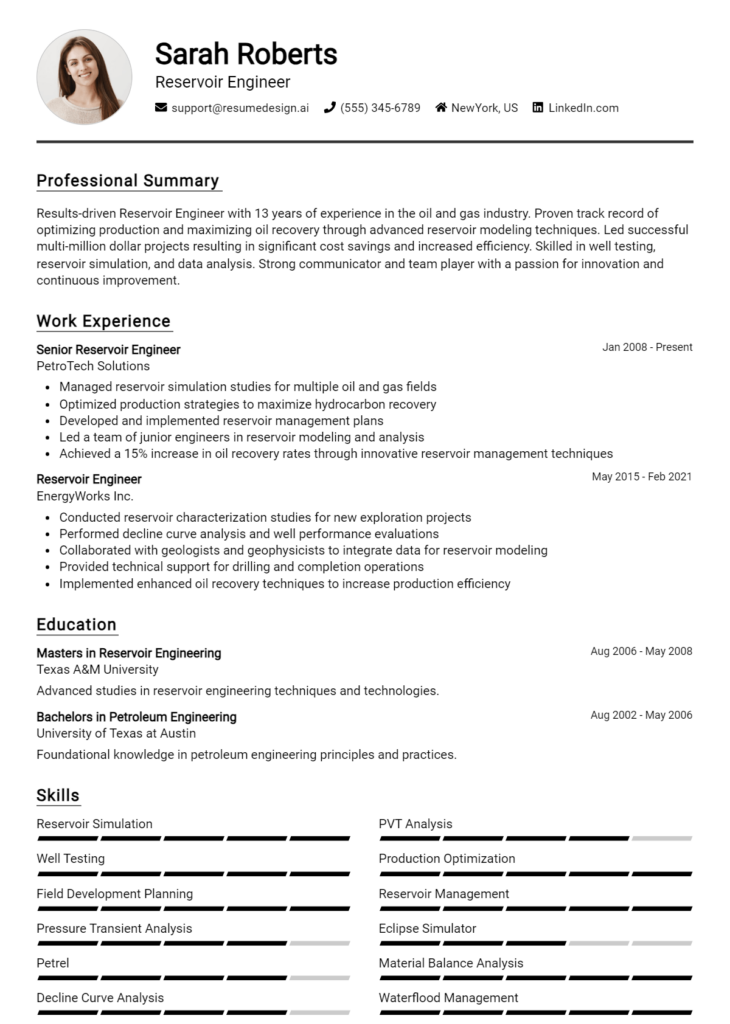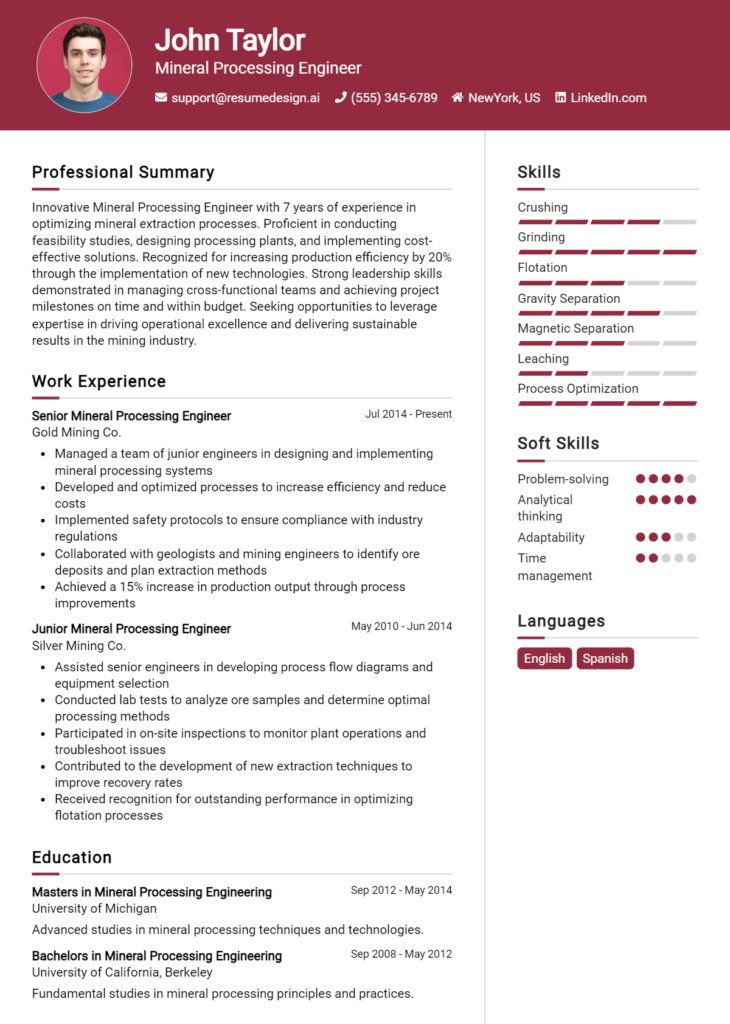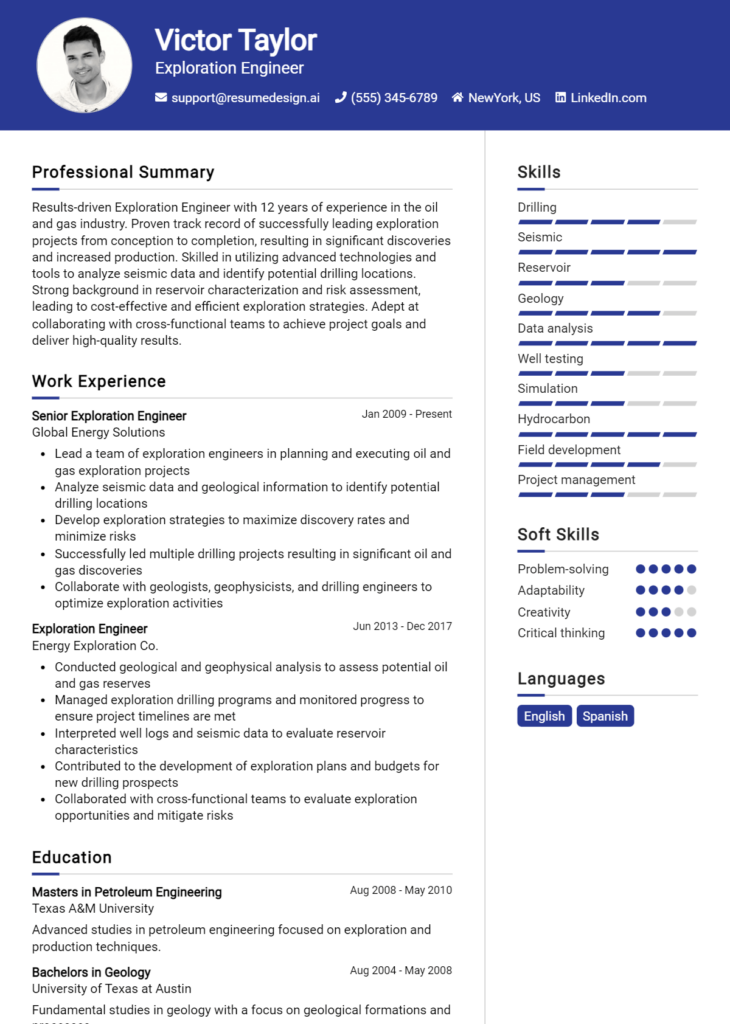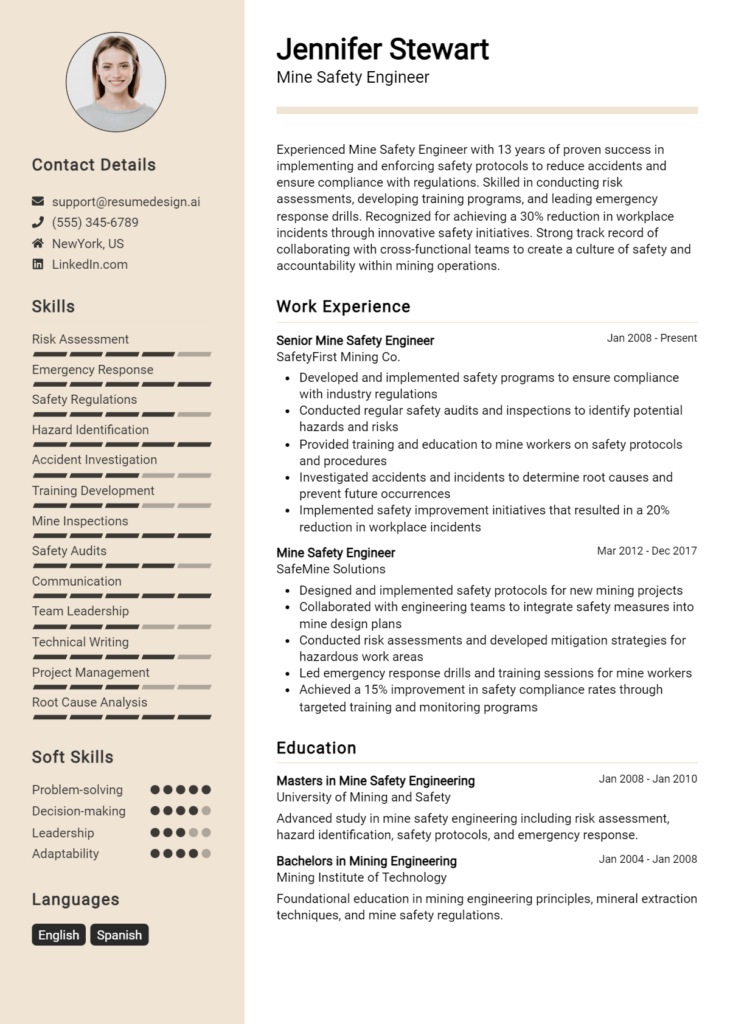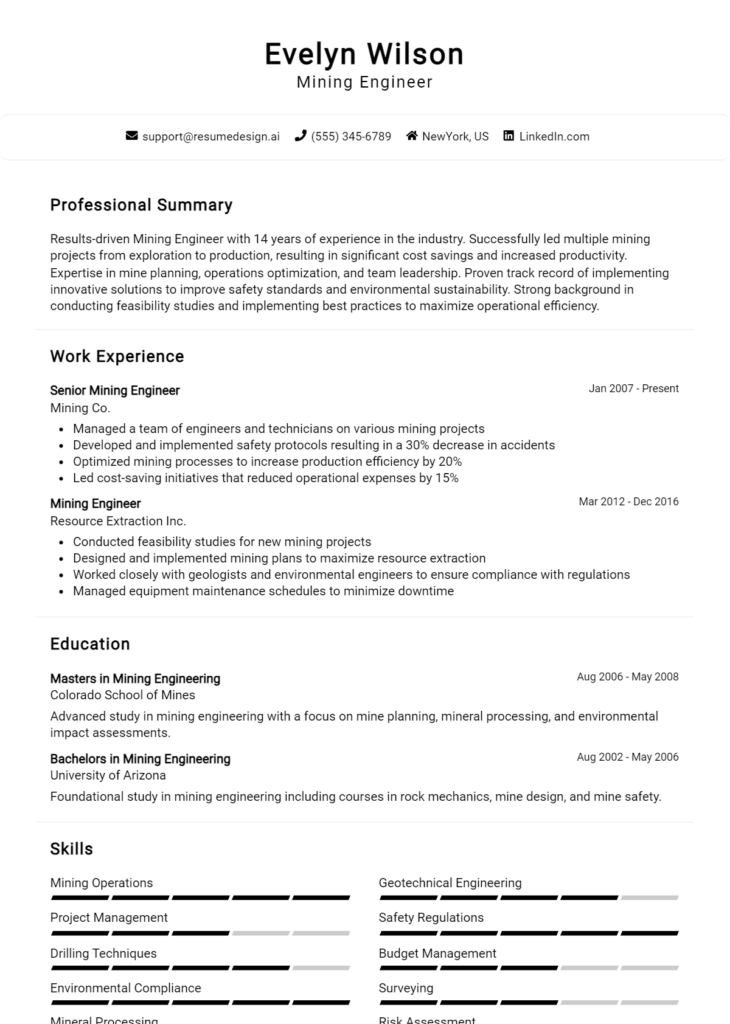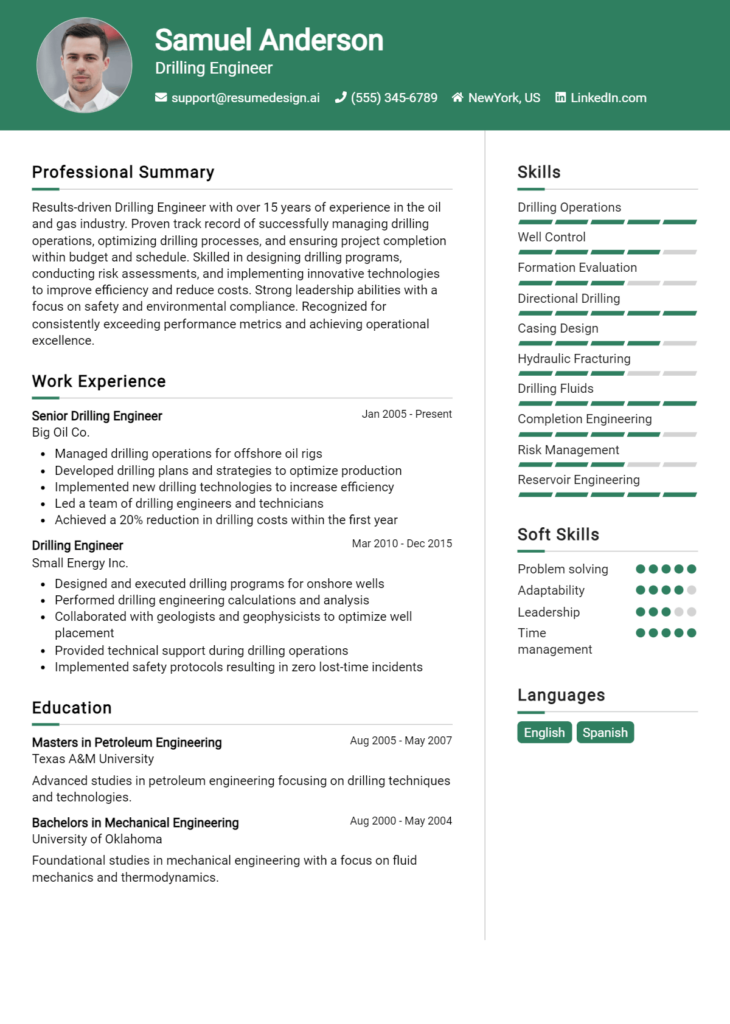Offshore Engineering Specialist Core Responsibilities
An Offshore Engineering Specialist plays a crucial role in bridging various departments, ensuring seamless collaboration between engineering, operations, and project management. Key responsibilities include designing offshore structures, conducting risk assessments, and troubleshooting technical issues. Essential skills encompass strong technical knowledge, operational expertise, and advanced problem-solving abilities. These competencies are vital for meeting organizational goals and enhancing project efficiency. A well-structured resume can effectively showcase these qualifications, making candidates stand out in a competitive job market.
Common Responsibilities Listed on Offshore Engineering Specialist Resume
- Design and analyze offshore structures and systems.
- Conduct feasibility studies and risk assessments.
- Collaborate with cross-functional teams to ensure project success.
- Develop and implement engineering solutions for operational challenges.
- Monitor and evaluate project performance against key metrics.
- Provide technical support during installation and commissioning.
- Ensure compliance with industry regulations and safety standards.
- Prepare technical documentation and reports for stakeholders.
- Stay updated on emerging technologies and industry trends.
- Participate in training and development initiatives.
- Conduct site inspections and audits to ensure operational integrity.
High-Level Resume Tips for Offshore Engineering Specialist Professionals
In the competitive field of offshore engineering, a well-crafted resume serves as the essential first impression you make on potential employers. It is your opportunity to showcase not only your technical skills and specialized knowledge but also your achievements and contributions to past projects. A meticulously designed resume tailored to the specific role of an Offshore Engineering Specialist can significantly enhance your chances of standing out in a crowded job market. This guide will provide practical and actionable resume tips specifically tailored for Offshore Engineering Specialist professionals, ensuring you present a compelling narrative of your career journey.
Top Resume Tips for Offshore Engineering Specialist Professionals
- Tailor your resume to match the job description by incorporating relevant keywords and phrases.
- Highlight your experience in offshore projects, detailing your specific roles and responsibilities.
- Quantify your achievements with metrics, such as cost savings, project timelines, or efficiency improvements.
- Showcase your proficiency in industry-specific software and tools, emphasizing certifications and training.
- Include a section for professional affiliations and memberships in relevant organizations.
- Demonstrate your understanding of safety regulations and compliance standards in offshore engineering.
- Utilize a clean and professional layout that enhances readability and draws attention to key sections.
- Incorporate a summary statement that encapsulates your unique value proposition as an Offshore Engineering Specialist.
- List any relevant technical skills, such as structural analysis, fluid dynamics, or marine operations.
- Keep your resume concise, ideally one to two pages, focusing on the most pertinent information.
By implementing these tips, you can significantly increase your chances of landing a job in the Offshore Engineering Specialist field. A well-structured resume that effectively communicates your skills, experiences, and accomplishments will resonate with hiring managers and set you on the path to securing your desired position in this dynamic industry.
Why Resume Headlines & Titles are Important for Offshore Engineering Specialist
In the competitive field of offshore engineering, a well-crafted resume headline or title serves as a critical first impression for potential employers. For an Offshore Engineering Specialist, this brief phrase can instantly capture the attention of hiring managers by summarizing key qualifications and unique skills in a single impactful statement. A strong headline should be concise, relevant, and directly aligned with the specific job being applied for, ensuring that it resonates with the hiring team and highlights the candidate’s suitability for the role.
Best Practices for Crafting Resume Headlines for Offshore Engineering Specialist
- Keep it concise—aim for no more than 10 words.
- Use industry-specific keywords to enhance relevance.
- Highlight your most important qualifications or achievements.
- Be specific about your area of expertise within offshore engineering.
- Tailor the headline to match the job description directly.
- Incorporate quantifiable results or experiences when possible.
- Avoid using vague terms—be clear and precise.
- Showcase your unique value proposition as a candidate.
Example Resume Headlines for Offshore Engineering Specialist
Strong Resume Headlines
"Experienced Offshore Engineer with 10+ Years in Deepwater Projects"
“Innovative Offshore Engineering Specialist Focused on Sustainable Solutions”
"Proven Track Record in Project Management for Offshore Installations"
"Safety-Driven Offshore Engineering Expert with Stellar Compliance Record"
Weak Resume Headlines
“Engineer Looking for Opportunities”
“Offshore Engineering Professional”
Strong headlines are effective because they convey specific strengths and achievements that immediately inform the hiring manager of the candidate's qualifications. They use precise language and industry terminology that resonate with the job requirements, creating a compelling snapshot of the candidate’s capabilities. In contrast, weak headlines lack detail and specificity, making them forgettable and failing to capture the essence of the candidate's experience. This generic approach diminishes the impact of the resume, leaving hiring managers with little reason to delve deeper into the application.
Writing an Exceptional Offshore Engineering Specialist Resume Summary
A well-crafted resume summary is crucial for an Offshore Engineering Specialist, as it serves as the first impression for hiring managers. This brief section of your resume quickly captures attention by highlighting your key skills, relevant experience, and significant accomplishments in the field. A strong summary should be concise and impactful, tailored specifically to the job you are applying for. This customization not only demonstrates your genuine interest in the role but also showcases your understanding of the specific competencies the employer values, making it easier for them to see your potential fit within their team.
Best Practices for Writing a Offshore Engineering Specialist Resume Summary
- Quantify Achievements: Use specific numbers to demonstrate your impact, such as budget management or project timelines.
- Focus on Key Skills: Highlight the technical and soft skills that are most relevant to the role.
- Tailor for the Job Description: Customize your summary to align with the specific requirements outlined in the job posting.
- Use Action Words: Begin sentences with strong verbs to convey confidence and proactiveness.
- Keep It Concise: Aim for 2-4 sentences that capture your essence without unnecessary fluff.
- Showcase Industry Knowledge: Mention specific technologies, methodologies, or regulatory frameworks you are familiar with.
- Include Relevant Certifications: If applicable, mention any certifications or licenses that add credibility to your expertise.
- Highlight Collaborative Skills: Emphasize your ability to work within diverse teams and manage stakeholder relationships.
Example Offshore Engineering Specialist Resume Summaries
Strong Resume Summaries
Dynamic Offshore Engineering Specialist with over 10 years of experience in deepwater drilling projects, successfully managing budgets exceeding $5 million and reducing operational costs by 15% through innovative engineering solutions.
Results-driven Offshore Engineer proficient in subsea systems design and installation, recognized for leading a cross-functional team to complete a critical project 3 months ahead of schedule, enhancing safety standards and client satisfaction.
Detail-oriented Offshore Engineering Specialist with a proven track record in risk assessment and mitigation, having implemented strategies that decreased incident rates by 30% over a 5-year period in high-pressure environments.
Weak Resume Summaries
Experienced engineer looking for opportunities in offshore engineering.
Passionate about engineering and eager to contribute to offshore projects.
The strong resume summaries are effective because they contain specific achievements and metrics that demonstrate the candidate's value, making them relevant to the role. They highlight concrete skills and experiences that align with the expectations of hiring managers in the offshore engineering sector. In contrast, the weak summaries are vague and lack detail, failing to showcase any measurable outcomes or specific expertise, which makes them less compelling to prospective employers.
Work Experience Section for Offshore Engineering Specialist Resume
The work experience section of an Offshore Engineering Specialist resume is crucial in demonstrating a candidate's technical acumen, teamwork capabilities, and ability to deliver high-quality projects in demanding environments. This section serves as a narrative of the candidate's professional journey, showcasing relevant experiences that highlight their proficiency in offshore engineering practices. By quantifying achievements and aligning past roles with industry standards, candidates can effectively illustrate their value to prospective employers, making a compelling case for their technical skills and leadership qualities.
Best Practices for Offshore Engineering Specialist Work Experience
- Highlight relevant technical skills specific to offshore engineering projects.
- Quantify achievements with specific metrics, such as cost savings, time reduction, or increased efficiency.
- Detail leadership roles in managing multidisciplinary teams and project coordination.
- Align experiences with industry standards and best practices to demonstrate sector knowledge.
- Use action verbs to convey initiative and impact in previous roles.
- Include examples of problem-solving or innovation that led to successful project outcomes.
- Demonstrate collaboration with stakeholders, contractors, and regulatory bodies.
- Showcase continuous professional development, such as certifications or training attended.
Example Work Experiences for Offshore Engineering Specialist
Strong Experiences
- Led a team of 10 engineers in the successful design and implementation of a subsea pipeline project, resulting in a 20% reduction in projected costs.
- Managed offshore rig operations that improved production efficiency by 30% through the integration of advanced drilling technologies.
- Coordinated cross-functional teams to execute a complex offshore installation that met all safety and regulatory standards, reducing incident rates by 15%.
- Developed a risk management framework that decreased downtime by 25% during maintenance operations across multiple offshore platforms.
Weak Experiences
- Worked on various engineering projects.
- Assisted with some offshore operations and tasks.
- Participated in team meetings to discuss project updates.
- Helped in the coordination of engineering activities.
The examples listed as strong experiences are considered effective because they provide specific, quantifiable results and demonstrate the candidate's technical leadership and collaborative efforts in high-impact projects. In contrast, the weak experiences lack detail and measurable outcomes, making it difficult for employers to gauge the candidate's contributions and abilities in offshore engineering contexts.
Education and Certifications Section for Offshore Engineering Specialist Resume
The education and certifications section of an Offshore Engineering Specialist resume is crucial in demonstrating the candidate's academic credentials and commitment to professional development. This section highlights not only the foundational knowledge gained through formal education but also the industry-relevant certifications that showcase a candidate’s expertise and specialization in offshore engineering. Continuous learning efforts are essential in this rapidly evolving field, and providing relevant coursework, certifications, and specialized training can significantly enhance a candidate's credibility and alignment with the job role, making them a more appealing choice for potential employers.
Best Practices for Offshore Engineering Specialist Education and Certifications
- Focus on relevance: Include degrees and certifications that are directly related to offshore engineering or related fields.
- Be detailed: Provide specifics about your degree, such as the name of the institution, degree earned, and graduation date.
- Highlight advanced credentials: Prioritize advanced degrees (e.g., Master's, Ph.D.) and recognized industry certifications (e.g., API, DNV GL).
- Include specialized training: Mention any training that enhances your skill set, such as courses in safety management or environmental regulations.
- List relevant coursework: If applicable, include specific courses that align with offshore engineering projects or technologies.
- Update regularly: Ensure your education and certifications are current, reflecting any new qualifications or ongoing professional development.
- Use industry-specific terminology: Incorporate terms and acronyms commonly recognized in the offshore engineering field to demonstrate familiarity.
- Showcase continuous learning: Highlight any ongoing education or workshops that showcase your commitment to staying updated in the field.
Example Education and Certifications for Offshore Engineering Specialist
Strong Examples
- M.S. in Offshore Engineering, University of Technology, Graduated May 2022
- Certified Offshore Safety and Emergency Response (COSER) - International Safety Training Centre, 2023
- Project Management Professional (PMP) Certification - Project Management Institute, 2021
- Relevant Coursework: Subsea Engineering, Marine Structures, and Risk Management in Offshore Projects
Weak Examples
- Bachelor of Arts in English Literature, University of Arts, Graduated June 2010
- Basic First Aid Certification - 2015 (not specific to offshore environments)
- Online Course in Creative Writing - Coursera, 2020
- Diploma in Graphic Design - Community College, 2018
The examples listed as strong are considered relevant and aligned with the requirements for an Offshore Engineering Specialist, showcasing advanced degrees and recognized certifications that are pertinent to the industry. On the other hand, the weak examples reflect qualifications that lack relevance to the offshore engineering field, such as unrelated degrees and certifications that do not enhance the candidate's profile for the job, ultimately detracting from their overall credibility.
Top Skills & Keywords for Offshore Engineering Specialist Resume
In the competitive field of offshore engineering, a well-crafted resume is crucial for standing out to potential employers. Highlighting the right skills can significantly enhance your chances of landing an interview. Both hard and soft skills play a vital role in showcasing your competency and adaptability in this specialized industry. Hard skills display your technical expertise and knowledge, while soft skills reflect your ability to collaborate, communicate, and manage challenges effectively. Striking the right balance between these skills is essential to demonstrate your qualifications as an Offshore Engineering Specialist.
Top Hard & Soft Skills for Offshore Engineering Specialist
Soft Skills
- Effective Communication
- Team Collaboration
- Problem-Solving
- Adaptability
- Leadership
- Time Management
- Attention to Detail
- Conflict Resolution
- Critical Thinking
- Decision-Making
Hard Skills
- Offshore Structural Design
- Subsea Engineering
- Project Management
- Risk Assessment and Management
- Hydrostatic and Hydrodynamic Analysis
- Material Selection and Testing
- Environmental Compliance
- CAD Software Proficiency
- Pipeline Design and Installation
- Safety Management Systems
By emphasizing these skills in your resume, along with relevant work experience, you can create a compelling narrative that highlights your qualifications and readiness to excel in the offshore engineering domain.
Stand Out with a Winning Offshore Engineering Specialist Cover Letter
Dear Hiring Manager,
I am writing to express my interest in the Offshore Engineering Specialist position at [Company Name]. With a robust background in offshore engineering, complemented by my hands-on experience in project management and a deep understanding of marine systems, I am excited about the opportunity to contribute to your team. My expertise in designing, analyzing, and implementing offshore structures has equipped me with the skills necessary to tackle complex engineering challenges while ensuring compliance with safety and environmental regulations.
Throughout my career, I have successfully led various offshore projects, from concept development through to execution. At [Previous Company Name], I played a pivotal role in the design and installation of subsea pipelines, which not only enhanced operational efficiency but also significantly reduced costs. My ability to collaborate effectively with cross-functional teams, coupled with my strong analytical skills, enables me to identify potential project risks and devise effective mitigation strategies. I thrive in fast-paced environments and am committed to delivering high-quality engineering solutions that meet both client expectations and industry standards.
I am particularly drawn to [Company Name] because of your commitment to innovation and sustainable practices in offshore engineering. I am eager to bring my technical skills, passion for the industry, and dedication to continuous improvement to your esteemed organization. I look forward to the possibility of discussing how my background, skills, and enthusiasms align with the goals of your team.
Thank you for considering my application. I am excited about the opportunity to contribute to your projects and help drive success at [Company Name]. I hope to discuss my candidacy further in an interview setting.
Sincerely,
[Your Name]
[Your Contact Information]
Common Mistakes to Avoid in a Offshore Engineering Specialist Resume
When crafting a resume for the position of Offshore Engineering Specialist, it is crucial to present your qualifications and experiences effectively. Many candidates make common mistakes that can hinder their chances of securing an interview. By avoiding these pitfalls, you can create a compelling resume that highlights your expertise in offshore engineering. Here are some common mistakes to watch out for:
Lack of Specificity: Failing to include specific details about your previous roles and projects can make your resume vague. Instead, quantify your accomplishments and describe your contributions in concrete terms.
Ignoring Relevant Skills: Offshore engineering requires a unique set of skills. Not showcasing relevant technical skills, software proficiencies, and certifications may lead to missed opportunities.
Poor Formatting: A cluttered or overly complex resume layout can detract from your qualifications. Use clear headings, bullet points, and consistent formatting to enhance readability.
Generic Objective Statements: Using a one-size-fits-all objective statement can make your resume blend in. Tailor your objective to reflect your interest in offshore engineering and the specific employer.
Neglecting Keywords: Many companies use applicant tracking systems (ATS) to filter resumes. Failing to include industry-specific keywords can result in your resume being overlooked.
Overly Technical Jargon: While industry terminology is important, overloading your resume with jargon can alienate readers. Strive for a balance that demonstrates expertise without being overly complex.
Failure to Highlight Teamwork and Leadership: Offshore projects often require collaboration. Not emphasizing your teamwork and leadership experiences can give the impression that you are not a strong fit for a collaborative environment.
Not Proofreading: Typos and grammatical errors can undermine your professionalism. Always proofread your resume to ensure it is free of mistakes, as attention to detail is critical in engineering roles.
Conclusion
In summary, the role of an Offshore Engineering Specialist is crucial in ensuring the successful design, construction, and maintenance of offshore structures and systems. Key responsibilities include conducting feasibility studies, overseeing the installation of equipment, ensuring compliance with safety and environmental regulations, and collaborating with multidisciplinary teams to deliver projects on time and within budget. Additionally, specialized knowledge in areas such as subsea engineering, marine operations, and risk management is essential for success in this field.
As the demand for skilled Offshore Engineering Specialists continues to grow, it's vital to present an impressive resume that highlights your expertise and experience. Take the time to review and enhance your resume to stand out in this competitive job market.
To assist you in this process, consider utilizing various resources available online. You can explore a variety of resume templates tailored for engineering roles, or use the resume builder to create a personalized document that showcases your skills effectively. Additionally, reviewing resume examples can provide inspiration, while cover letter templates can help you craft an impactful introduction to your applications.
Don’t wait – elevate your professional presentation today!

